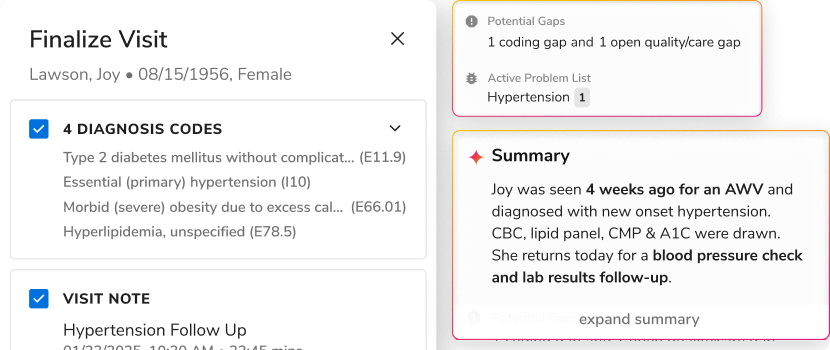Streamlining Care Management With Evidence-Based Clinical Decisions Support Tools

Every decision, medication, and follow-up appointment shapes a patient's path to wellness, especially during the critical 30-day post-discharge period. This is particularly vital given the scope of chronic disease in America: According to recent CDC data, chronic diseases represent a massive burden on the US healthcare system.
An estimated 129 million Americans have at least one major chronic disease, with 42% having two or more conditions, and 12% dealing with at least five chronic conditions. These diseases account for seven out of ten deaths annually and consume about 90% of the annual $4.1 trillion healthcare expenditure. To address this challenge while meeting critical NCQA and URAC accreditation standards, healthcare organizations need solutions that support whole-person care—addressing both physical and psychosocial needs within their population health initiatives.
This burden is particularly concerning as chronic conditions rarely exist in isolation, and patients with multiple conditions face increased risks of complications and hospital readmissions. The first 30 days post-hospital discharge represents a vital period for patient recovery, especially for those with chronic conditions. Every decision, medication, and follow-up appointment shapes a patient's path to wellness during this pivotal period. For patients with chronic conditions, this transition is particularly delicate. The reality is stark: approximately 20% of Medicare beneficiaries are back in hospital within this 30-day window, triggering $26 billion in annual costs—with a staggering $17 billion labeled as preventable readmissions. This isn't just a financial burden; it's a clear signal that our traditional approach to transitional care needs reimagining.
This is where effective care management becomes essential, providing patients with the support they need post-discharge, ensuring they follow prescribed care plans, and identifying potential health risks before they escalate. However, to truly improve outcomes, care teams need advanced tools to support their efforts.
How do Evidence-Based Clinical Decision Support (CDS) Tools Improve Chronic Care Management?
Integrating evidence-based Clinical Decision Support (CDS) within care management solutions plays a crucial role in improving patient care and reducing readmissions. These tools leverage the latest clinical evidence, guidelines, and patient-specific data to provide real-time recommendations and alerts that enhance care delivery.
Some benefits of integrating evidence-based CDS tools:
- Improving Care Plan Development and Management: Evidence-based Clinical Decision Support (CDS) tools empower care teams to create and maintain comprehensive, up-to-date care plans. They suggest patient condition-specific interventions, identify potential drug interactions, recommend preventive care measures, and alert providers to gaps in care or guideline deviations.
- Enhancing Care Coordination: CDS systems improve care coordination by centralizing patient information, generating automated alerts for care transitions, offering decision support for referrals to specialists, and tracking quality measures, leading to more cohesive and patient-centered care for those with multiple chronic conditions.
- Supporting Medication Management:CDS improves medication management for complex patient regimens through real-time alerts for drug interactions, dose adjustment suggestions, adherence strategies, and therapeutic alternatives to optimize treatment.
- Facilitating Better Patient Engagement: CDS systems enhance self-management by generating personalized educational materials, providing decision aids, offering monitoring reminders (e.g., blood glucose checks, and blood pressure measurements), and facilitating secure care team communication.
Implementing Evidence-Based CDS in Chronic Care Management
While the potential benefits of integrating evidence-based CDS into CCM are significant, successful implementation requires careful planning and consideration. Key factors to address include:
- Interoperability: Ensuring seamless integration with InCare, which unifies patient data across multiple EHRs and enables care teams to access decision support within their existing workflows.
- User-centered design: Developing CDS interfaces that are intuitive and align with clinical workflows to promote adoption and minimize alert fatigue.
- Evidence currency: Establishing processes for regularly updating CDS algorithms and recommendations based on the latest clinical evidence and guidelines.
- Performance monitoring: Implementing mechanisms to track the impact of CDS on clinical outcomes, provider satisfaction, and overall care quality.
- Provider education: Offering training and support to help healthcare providers effectively use CDS tools in their CCM practices.
Zynx Health and Innovaccer: A Unified Approach for Better Patient Outcomes
Managing chronic conditions requires a shift from reactive treatment to proactive prevention—focusing on reducing complications, preventing readmissions, and improving long-term outcomes. As healthcare providers face increasing complexity in chronic care delivery, the need for sophisticated, evidence-based tools becomes critical.
The integration of Zynx Health’s evidence-based care content within Innovaccer’s care management platform provides a powerful solution, allowing providers to deliver proactive, personalized care that keeps patients on the path to recovery. By focusing on preventing readmissions and managing chronic conditions, this integrated approach not only improves patient outcomes but also reduces healthcare costs, paving the way for a more sustainable, value-based healthcare system.
With this partnership, care teams using the integrated solution can now gain access to tools that support 34 chronic care conditions, and manage 125 common medical issues while also addressing behavioral health (BH) and social determinants of health (SDOH), ensuring a holistic and patient-centered approach to care.
With $17 billion in preventable readmissions at stake, the time to transform care management is now. Learn how Innovaccer's Care Management solution can help your organization reduce costly readmissions and deliver better chronic care outcomes. Contact us today to explore how our evidence-based solutions can be tailored to your specific needs.

.png)





.png)









.svg)
.svg)

.svg)

